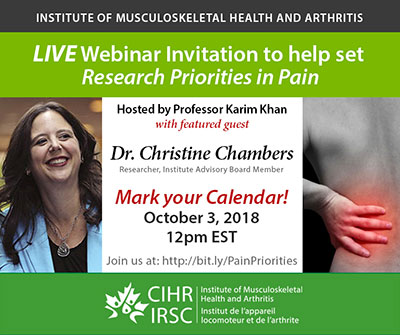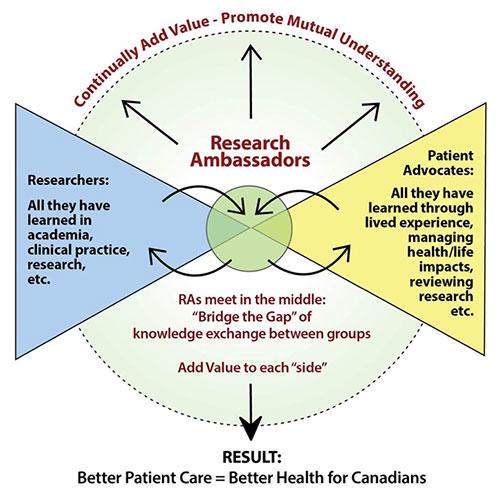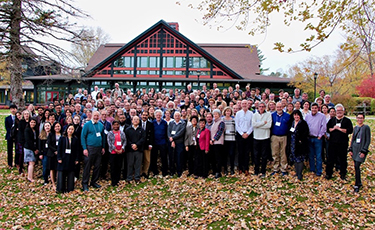IMHA 2018-2020 Priority Setting and National Listening Tour
IMHA’s mission is to improve the Health of Canadians. Within IMHA’s mandate, the Scientific Director aims to help strengthen our research community by engaging broadly, convening events, and making strategic funding decisions with appropriate consultation. In 2018-2020, IMHA undertook a priority setting and national outreach process that was guided by our Institute Advisory Board and involved research communities across Canada.

Listening Tour Schedule
- Oral and Dental Health: February, 2018, Vancouver, BC
- Global Health Consultation Meeting: April 10, 2018, Vancouver, BC
- Military Medicine: April 18, 2018, Ottawa, ON
- Institute Advisory Board Meeting: April 19-20, 2018, Montreal, QC
- SPOR Chronic Pain Network: April 24, 2018, Hamilton, ON
- ME/CFS Conference: May 3-5, 2018, Montreal, QC
- Research Ambassadors Meeting: May 23-24, 2018, Halifax, NS
- Canadian Dermatology Association Annual Conference: June 20 – 23, 2018, Montreal, QC
- Institute Advisory Board Meeting: July 24-25, 2018, Ottawa, ON
- Live Webinars: Setting Research Priorities for IMHA Communities: September 2018 - June 2019
- Institute Advisory Board Meeting: October 25-26, 2018, Vancouver, BC
- Research Ambassadors Meeting: October 31 - November 1, 2018, Montreal, QC
- Presentation/Q&A Townhall “Ask me anything”: April 23, 2019, Simon Fraser University, Burnaby, BC
- Presentation/Q&A Townhall “Ask me anything”: May 27-28, 2019, University of Saskatchewan, Saskatoon, SK
- Institute Advisory Board Meeting: October 2-3, 2019, Vancouver, BC
- International Conference on Neuromuscular Disease and Biology: October 17-19, 2019 Ottawa, ON
- International Conference on the Chemistry and Biology of Mineralized Tissues: October 20-25, 2019 Montebello, QC
- CIHR Healthy Cities Research Initiative: October 30, 2019, Victoria, BC
- Institute Advisory Board Meeting: January 30-31, 2020, Toronto, ON
- Institute Advisory Board Meeting: June 16-17, 2020, Ottawa, ON
- Patient Engagement Research Ambassadors Meeting: June 23, 2020, Virtual Event
- Patient Engagement Research Ambassadors Meeting: July 13, 2020, Virtual Event
- Patient Engagement Research Ambassadors Meeting: August 11, 2020, Virtual Event
- Patient Engagement Research Ambassadors Meeting: September 14, 2020, Virtual Event
- Institute Advisory Board Meeting: October 14, 2020, Virtual Event
- IMHA Network Webinar Series: Ask Us Anything! Canadian Skin Network, December 1, 2020
- IMHA Webinar: On Long-COVID, January 13, 2021
- IMHA Webinar: A Conversation with the Canadian Pain Task Force, February 2, 2021
- Institute Advisory Board Meeting: February 3, 2021, Virtual Event
- IMHA Webinar: Strategic Tips for Trainees, February 9, 2021
- IMHA Webinar: A Conversation about Myalgic Encephalomyelitis, March 9, 2021
IMHA Priority Setting
By Anne Tarazi and Dr. Francois Dionne
There can never be enough research funding so we need to pay close attention to how we allocate precious resources. IMHA’s mission is to improve the Health of Canadians. Within IMHA’s mandate, the Scientific Director aims to support the national research community and make funding decisions with appropriate consultation in a fair, ethical, and transparent manner. Here’s an outline of some steps that Professor Karim Khan has guided so far.
How is IMHA setting priorities?

The IMHA priority setting process has two parts. The first is a coordinated outreach to IMHA’s research communities to identify their priority areas; the second uses a multi-criteria decision analysis (MCDA) method to rank those priorities. The Scientific Director and IMHA’s Institute Advisory Board (IAB) who also serve as the Priority Setting Committee, identified the following research communities at the beginning of the process: 1/ skin, 2/ inflammation, 3/ orthopaedic surgery, 4/ pain, 5/ muscle, 6/ rehabilitation, mobility and disability, 7/ musculoskeletal diseases, 8/ metabolic bone disease, 9/ arthritis and 10/ oral health.
Research community leaders (members and guests of the IAB) held focus groups and ran surveys to identify current priorities in each community. Results of this initial outreach were then presented in a series of nine national webinars from September to December 2018. Between 20 and 100 Canadian investigators and patients/carers joined each webinar and used a live chat box function to post comments and ask questions during the presentation.

Here’s a snapshot of our National webinar on IMHA-related Pain research, held October 3rd, 2018:
- IMHA’s Scientific Director, Professor Karim Khan explained the purpose of the webinars and how participants could influence IMHA priorities
- Dr. Christine Chambers, Pain Community leader and IAB member, presented results from her outreach activities to Pain Community stakeholders
- The floor opened to 90+ participants, who asked questions, made comments and shared concerns using the live chat function
Those who could not attend live webinars were invited to watch the recorded audio and slide presentations, then contribute their thoughts by emailing in to imha-iala@cihr-irsc.gc.ca, or via IMHA’s twitter account (@KarimKhan_IMHA). Over 650 people have actively engaged in this public consultation to date.
The Multi-Criteria Decision Analysis (MCDA) method
Once each community has identified its priority areas, the IAB will use the MCDA method to rank these priorities. This approach combines IMHA’s strategic aims and stakeholder values to construct 10 decision criteria. The IAB then assigns a relative weight to each criterion to reflect its strategic importance. View the criteria: IMHA Criteria Tool 2018: Screening [ PDF (70 KB) ]. Comments are welcome via email: imha-iala@cihr-irsc.gc.ca. IMHA also hired specialists Professor Craig Mitton and Dr. Francois Dionne from Prioritize Consulting, to share their combined 20-year expertise in health care and health research priority setting. This helps inform the Scientific Director to allocate resources effectively for 2019-2022.
What does this achieve?
IMHA believes that this process makes our Institute more responsive to its research communities’ needs and leads to fair resource allocation. IMHA’s final priorities will be communicated in April 2021.
IMHA Priority Setting: A big thank you to all involved!

The Institute of Musculoskeletal Health and Arthritis (IMHA) Priority Setting process relied on input from you. Over 1,000 patients, carers, researchers, and policy makers across Canada joined us in one or more of our ten national webinars - both live and recorded. We received comments, suggestions and questions during the webinars, but also via email and Twitter after each session. Thank you for voicing your thoughts! We now have a better understanding about what is most important to our stakeholders – our valued Musculoskeletal Health and Arthritis research communities.
We also wish to thank our Institute Advisory Board (IAB) Members who led surveys, focus groups and webinars with their individual communities. Your rich networks, time, expertise and support for the process is invaluable.
Lastly, thank you to our Prioritize Consultants, Drs. Craig Mitton and Francois Dionne, for guiding our formal process. Your expertise helped us clearly define our values and use those values as a foundation to make funding decisions.
For those of you curious about the process we used to set priorities (including formulating the criteria) you can read about it here. We’re always open to feedback! Email or Tweet us! We look forward to hearing from you.
Tell your peers about IMHA!
We want to connect with all associations and organizations who serve Canadians. Let’s promote Musculoskeletal Health and mitigate Arthritis. We want to see everyone at the table as we form IMHA’s 2021-2026 Strategic Plan. If you have not already done so, please spread the word by encouraging your colleagues to subscribe to our IMHA This Month! Newsletter. They can do so by emailing IMHA-IALA@cihr-irsc.gc.ca.
Thanks again for engaging with us!
- Team IMHA
Vancouver
Global Health Research Consultation

On April 10th, the Institute of Musculoskeletal Health and Arthritis co-hosted one of four Global Health Research Joint Consultation meetings with the Institute of Population and Public Health (IPPH) and the International Development Research Centre (IDRC). These meetings aim to identify emerging global health challenges and opportunities for researchers in Canada and their relationships with health systems, chronic conditions and infectious diseases. Interdisciplinary teams, including specialists in global, community, indigenous and family health, Ecohealth, global governance, nutrition, epidemiology, physical activity and healthy cities are collaborating to improve people's health in Canada and the world.
Current foci of global health research in Canada are targeting globalization, equity, neglected diseases and transnational risks. These also include a commitment to improve gender equality and empower women and girls across all international assistance initiatives to ensure equity in global health programming. Communities, policy-makers and health care professionals can't plan for ways to improve health without first understanding the extent and nature of health problems. Results from these meetings will ensure Canadian research investments build upon and address existing health priorities, build capacity, and leverage partnerships both in Canada and abroad to tackle the most pressing global health challenges.
For more information on IPPH, funding and global health research profiles, please see the following links:
Highlights from the IMHA Institute Advisory Board meeting: Vancouver, October 2018
On October 25-26, in Vancouver, IMHA held its third Institute Advisory Board (IAB) meeting for 2018. The main focus was on Phase 3 of the priority setting process: discussion of topics identified during IMHA National Community Webinars. CIHR guest speaker Anne Martin-Matthews, Acting Vice-President, Research, Knowledge Translation and Ethics, gave inspired and inspiring insights into how Institute Advisory Boards can best help Scientific Directors. The message? It’s not about you. Each institute has the crucial role to serve Canadians by supporting quality health research aligned with the institute’s mandate. Anne underscored the valuable perspective that patients bring to the Institutes and to CIHR broadly. The research community at large should move up the ladder of patient involvement from advocacy to partnership (co-development) and patient-led initiatives.
Thank you to our other guests in attendance: Dr. Bruce Forster, Head, Department of Radiology, University of British Columbia; Dr. Craig Mitton, Professor, Health Services and Policy (HSP), University of British Columbia; Dr. Francois Dionne from Prioritize Consulting. Dr. Siân Bevan, Chief Science Officer, Arthritis Society and Dr. Joy MacDermid, Professor, School of Physical Therapy, University of Western Ontario joined for focussed discussion. All provided valuable insights for priorities in their research communities, potential partnership, and vision for future research direction.
Montreal
IMHA Institute Advisory Board Meeting

On April 19th, the IMHA Institute Advisory Board (IAB) reconvened for the first time with Professor Khan as the Scientific Director. With IMHA's previous strategic plan coming to completion in 2018, we need to evaluate and assess past directions as well as define health care gaps and priorities. Comprehensive discussions ensued throughout the two-day meeting around partnerships, patient engagement, priorities, challenges and opportunities, transparency, and community building.
Partnerships: IMHA and the Institute of Gender Health
The day began with guest speaker Dr. Cara Tannenbaum, Science Director for the Institute of Gender and Health (IGH), who spoke on Gender-based analysis in health research and its relevancy with IMHA. Dr. Tannenbaum included IGH's vision, integration strategy, innovations, trainee network, actions/indicators and impact goals, as well as collaboration in funding for IMHA-related projects. IMHA and IGH partnerships encompass a variety of areas: pathways to health equity, healthy and productive work, inflammation in chronic disease, pain research and sex as a biological variable. Sex differences with regard to chronic pain response, bone health and mobility, risk factors and the biological synthesis of pharmaceuticals were highlighted.
Spotlight on Patient engagement
IAB member Dawn Richards followed with background around the history of patient engagement in North American health care and advocacy groups. Topics spanned the importance of patient engagement, the challenges, apparent gaps, opportunities, and patient compensation. The board agrees on the invaluable insights patients and patient advocates bring to IMHA and research communities.
Priority Setting
To help IMHA set priorities and guide resource allocation, Prioritize Consultants Drs. Craig Mitton and Francois Dionne joined the IAB meeting from Vancouver via teleconference. Based on economic and ethical principles, priority setting tools were introduced and IAB members discussed decision making criteria relevant to IMHA. This approach will be instrumental in defining IMHA's resource allocation decisions in the future.
Moving Forward
Professor Khan thanks the Board and all special guests for attending the two-day meeting in Montreal, and values the breadth of knowledge, lived experience, discipline-specific insight and partnerships each individual brings to the table. This is an exciting time! We look forward to future meetings in July and October as the team moves closer implementing innovative plans and processes that will positively impact the health of Canadians related to oral, skin and musculoskeletal diseases and rehabilitation.
Celebrating Champions!
Read one patient's story of her courageous battle to regain health
A classic over-achiever, Sabrina had it all—a loving husband, two wonderful children, and a successful career. She was living the dream. That is, until an invisible, insidious condition set in: One that has been progressively robbing Sabrina's body of its ability to regenerate energy, one that has launched her on an epic journey lasting six years and spanning the continent. Read more
Highlights from the IMHA Research Ambassador’s meeting: Montreal, October 31 – November 1, 2018
In late October, IMHA’s Research Ambassadors (RAs) reconvened in Montreal. The two-day meeting began with a tour de table discussion on each member’s current activities related to IMHA. This was followed by Prof. Karim Khan updating members on activities in other Canadian patient groups, including the Strategy for Patient Oriented Research (SPOR).
Key initiatives identified at the May RA meeting (Halifax, NS) were reviewed: patient engagement; knowledge translation; research partnerships; communication strategies / awareness building; and strategic planning / global perspectives, and concrete priority actions were chosen for the group moving forward. Consensus from the meeting is to develop a series of videos and webinars with the goal to increase two-way communication between researchers and patients / patient advocates.
Dr. Richard Hovey suggested this graphic model and received input from colleagues at the RA table.
The IMHA Research Ambassador Model

The IMHA Research Ambassador Model – Long description
The IMHA Research Ambassador Model outlines how research ambassadors contribute to IMHA’s success by:
- Continually adding value
- Promoting mutual understanding
They meet in the middle, bridging the gap of knowledge exchange between groups and add value to each side. Research Ambassadors connect researchers, who have academic, clinical practice and research backgrounds with the lived experiences of Patient Advocates as they manage health/life impacts, review research etc.
This diagram was developed by RB Hovey in 2017 and is used with permission.
“Working together in a meaningful way necessitates finding a shared understanding (epistemology) and language of how we experience and communicate knowledge about a condition, learning how to learn from each other (ontology), and build relationship in a collaborative community of care that are meaningful, functional, and successful for everyone.”
Diagram adapted and about quote published with permission.
Hovery RB (2017). Occasionally a patient: Always a person (Perspective).
Journal of Patient Experience (pg 63). 1-2 doi: 0.1177/2374373517726074
Halifax
IMHA Research Ambassadors: A Powerhouse of Knowledge & Experience

In May, IMHA staff and the IMHA Research Ambassador team met for a 2-day meeting in Halifax, Nova Scotia. Who are the Research Ambassadors? They are people impacted by health-issues that fall under the IMHA mandate who have volunteered to be patient advocates for themselves or a loved one. The group is a powerhouse of knowledge and lived experience. And they all have a keen interest in helping shape patient-oriented research.
Research is typically about patients, but surprisingly, patients are not often actively involved. We all know this model is shifting but streamlining the process to fully integrate patient input is notoriously slow. "Changing this trend is like trying to turn the titanic on a dime. It's hard to change the culture when researchers have been doing the same things in the same ways with research success for 25 or 30 years", Anne Lyddiatt, IMHA Research Ambassador and national trainer for Patient Partners. Discussions at our Halifax meeting confirmed that the "Patient Engagement Box" is getting checked in many facets of musculoskeletal health research, but that researchers are still asking: How do I effectively include patients in research? Do I need to develop materials to do this on my own? How do I incorporate qualitative measurements into useful data sets?
UK research institutes are becoming international leaders in the art of patient partnerships. Qualitative research captures the richness and the language of how patients describe their experience. Guest speaker at the meeting, Dr. Tessa Richards, senior editor at The BMJ, emphasizes that the power of patient stories cannot be underestimated in research and medical articles. Patient content is well read by doctors, patients and politicians and open access articles reach a wide audience. Co-production (between researchers and patients) of scholarly comments and feature articles, patient-led content, patient inclusion in setting research priorities and design, and including a patient advocate in peer-review and advisory panels are all on an upward trend.
What will IMHA do next?
- Develop a "Research Ambassador Toolkit" with key CIHR and IMHA messages the Research Ambassadors can share with their communities
- Curate an online Resource Library of reliable source material relevant to MSK, skin and oral health
- Support Research Ambassadors through various targeted initiatives they are undertaking to raise awareness of conditions, disease prevention, and research opportunities
- Foster national and international network partnerships
- Continue with knowledge translation projects to not only help researchers utilize patient engagement, but to also provide practical information from the research community back to patient groups and communities.
Ottawa
Highlights from the IMHA Institute Advisory Board meeting: July 2018

On July 25-26, IMHA held its second Institute Advisory Board meeting for 2018 in Ottawa. The focus was priority setting and each board member presented thoughtful first steps into research priorities for the communities they represent. Key CIHR personnel attended the meeting and gave updates on CIHR future directions, funding mechanisms and partnerships.
Guest presentations
Michel Perron, CIHR Acting President and Executive Vice-President, updated members on CIHR's incoming President Dr. Michael Strong (October 1st, 2018), as well as the newly appointed Governing Council. Mr. Perron also elaborated on the 2018 Federal Budget implications for health research.
Dr. Eric Marcotte, Associate Director, CIHR Institute of Neurosciences, Mental Health and Addiction (INMHA) presented on funding mechanisms, touching on the strengths and benefits of Network Grants and Team Grants, as well as the return on investment of small Catalyst Grants.
David Clements, Director General and Daniele St-Jean, Project Advisor, CIHR Strategic Partnerships and International Relations, provided an overview of CIHR's Partnership Strategy. They outlined the department's objectives, challenges, and successes, and highlighted key partners for IMHA. Partnership grows the pie for research discovery.
Priority setting
Phase Two of IMHA's priority setting kicked off with each IAB member presenting three research priority areas requested by their communities: Dr. Alain Moreau presented on Oral Health; Dr. Anie Philip and Dr. An-Wen Chan highlighted the Skin community's priorities; Drs. Dawn Richards and Monique Gignac shared information from the Arthritis community; Dr. Christine Chambers discussed priorities around Pain; Dr. Julie Richardson voiced priorities for Rehabilitation; and Dr. Rashmi Kothari brought the Muscle community's priorities to the table. In the final session, Dr. Marc Pouliot presented priorities for the Inflammation community and Dr. Ed Harvey presented on Bone priorities. Dr. Joy MacDermid was an IAB guest, and she brought forward priorities for Musculoskeletal Health.
After the presentations, Dr. Francois Dionne from Prioritize Consulting, led the process of refining the IMHA priority tool down to ten criteria. These ten items will be used to assess and rank potential funding areas. The IMHA priority tool will help the Institute's Advisory Board and be shared with each research community to ensure transparency and equal opportunity for researchers interested in Musculoskeletal Health and Arthritis research.
September will mark the first of IMHA's national webinars for each research community. Please follow Professor Karim Khan's twitter feed (@KarimKhan_IMHA), CIHR's Facebook page and look for eBlasts for dates to join relevant webinars and influence IMHA priorities.
You can read about Phase One the IMHA Priority Setting in our July newsletter.
Live IMHA Webinars are underway!
More on IMHA and its current priorities
Webinars will be scheduled for each of our priority and research areas soon.
5th Ottawa International Conference on Neuromuscular Disease and Biology

The University of Ottawa Centre for Neuromuscular Disease hosted the 5th Ottawa International Conference on Neuromuscular Disease and Biology in October. (Ottawa NMD 2019). The two-and-a-half day conference focused on exciting breakthroughs in neuromuscular basic, translational and clinical research. Recent discoveries were highlighted by 36 world-leading neuromuscular researchers and clinicians to an audience of more than 300 attendees from Canada, Unites States and Europe. Advances in all aspects of NMD research, including new clinical diagnostic techniques, biology of disease pathogenesis, basic muscle and stem cell biology, and promising therapies to treat these devastating disorders were presented. Poster sessions and networking opportunities provided ample opportunity for basic scientists, clinical researchers and trainees to interact, foster new ideas and establish new collaborations. The conference was supported in part by a CIHR Planning and Dissemination Grant with opening remarks by Keynote speaker Dr. Karim Khan, Scientific Director of IMHA. Plans are already underway for Ottawa NMD 2021, tentatively scheduled for October 14-16th, 2021. Save the date!
Montebello
13th International Conference on the Chemistry and Biology of Mineralized Tissues (ICCBMT)

The ICCBMT conference series, which has been held every three years since 1981, is one of the most important scientific gatherings in the field of biological mineralization. From October 20-25, 2019, the 13th International Conference on the Chemistry and Biology of Mineralized Tissues (13th ICCBMT) was held in Montebello Quebec. Over 170 mineralized tissue researchers from around the world gathered together for four days to present their research findings, to network, and to develop new collaborative research efforts.
This scientific conference was organized by Professor Marc McKee of McGill's Faculty of Dentistry and Department of Anatomy and Cell Biology, along with co-organizers Steve Weiner from Israel, and Dobrawa Napierala from the USA. Dr. Natalie Reznikov, former postdoctoral fellow in Dentistry at McGill, was a member of the local organizing committee.
Invited guests included Plenary Lecturer Bjorn Olsen from Harvard who spoke on craniofacial diseases affecting bones and teeth. Martha Somerman, Director of NIDCR (NIH) and Karim Khan, Scientific Director of CIHR-IMHA gave talks on the vision of their institutes, funding possibilities, and potential partnerships. Sponsors and other partners funded 35 Young Investigator Awards to trainees ($1,000 US each), to attend the conference - about one-third of whom were from Canada.
- Date modified: